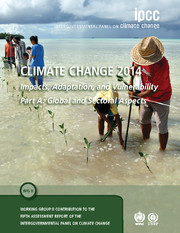 Climate Change 2014 – Impacts, Adaptation and Vulnerability: Part A: Global and Sectoral Aspects
Climate Change 2014 – Impacts, Adaptation and Vulnerability: Part A: Global and Sectoral Aspects Published online by Cambridge University Press: 05 January 2015
2.1. Introduction and Key Concepts
This chapter addresses the foundations of decision making with respect to climate impact, adaptation, and vulnerability (CIAV). The Fourth Assessment Report (AR4) summarized methods for assessing CIAV (Carter et al., 2007), which we build on by surveying the broader literature relevant for decision making.
Decision making under climate change has largely been modeled on the scientific understanding of the cause-and-effect process whereby increasing greenhouse gas emissions cause climate change, resulting in changing impacts and risks, potentially increasing vulnerability to those risks. The resulting decision-making guidance on impacts and adaptation follows a rational-linear process that identifies potential risks and then evaluates management responses (e.g., Carter et al., 1994; Feenstra et al., 1998; Parry and Carter, 1998; Fisher et al., 2007). This process has been challenged on the grounds that it does not adequately address the diverse contexts within which climate decisions are being made, often neglects existing decision-making processes, and overlooks many cultural and behavioral aspects of decision making (Smit and Wandel, 2006; Sarewitz and Pielke, 2007; Dovers, 2009; Beck, 2010). While more recent guidance on CIAV decision making typically accounts for sectoral, regional, and socioeconomic characteristics (Section 21.3), the broader decision-making literature is still not fully reflected in current methods. This is despite an increasing emphasis on the roles of societal impacts and responses to climate change in decision-making methodologies (high confidence) (Sections 1.1, 1.2, 21.2.1).
The main considerations that inform the decision-making contexts addressed here are knowledge generation and exchange, who makes and implements decisions, and the issues being addressed and how these can be addressed. These decisions occur within a broader social and cultural environment. Knowledge generation and exchange includes knowledge generation, development, brokering, exchange, and application to practice. Decision makers include policymakers, managers, planners, and practitioners, and range from individuals to organizations and institutions (Table 21-1).
To save this book to your Kindle, first ensure no-reply@cambridge.org is added to your Approved Personal Document E-mail List under your Personal Document Settings on the Manage Your Content and Devices page of your Amazon account. Then enter the ‘name’ part of your Kindle email address below. Find out more about saving to your Kindle.
Note you can select to save to either the @free.kindle.com or @kindle.com variations. ‘@free.kindle.com’ emails are free but can only be saved to your device when it is connected to wi-fi. ‘@kindle.com’ emails can be delivered even when you are not connected to wi-fi, but note that service fees apply.
Find out more about the Kindle Personal Document Service.
To save content items to your account, please confirm that you agree to abide by our usage policies. If this is the first time you use this feature, you will be asked to authorise Cambridge Core to connect with your account. Find out more about saving content to Dropbox.
To save content items to your account, please confirm that you agree to abide by our usage policies. If this is the first time you use this feature, you will be asked to authorise Cambridge Core to connect with your account. Find out more about saving content to Google Drive.